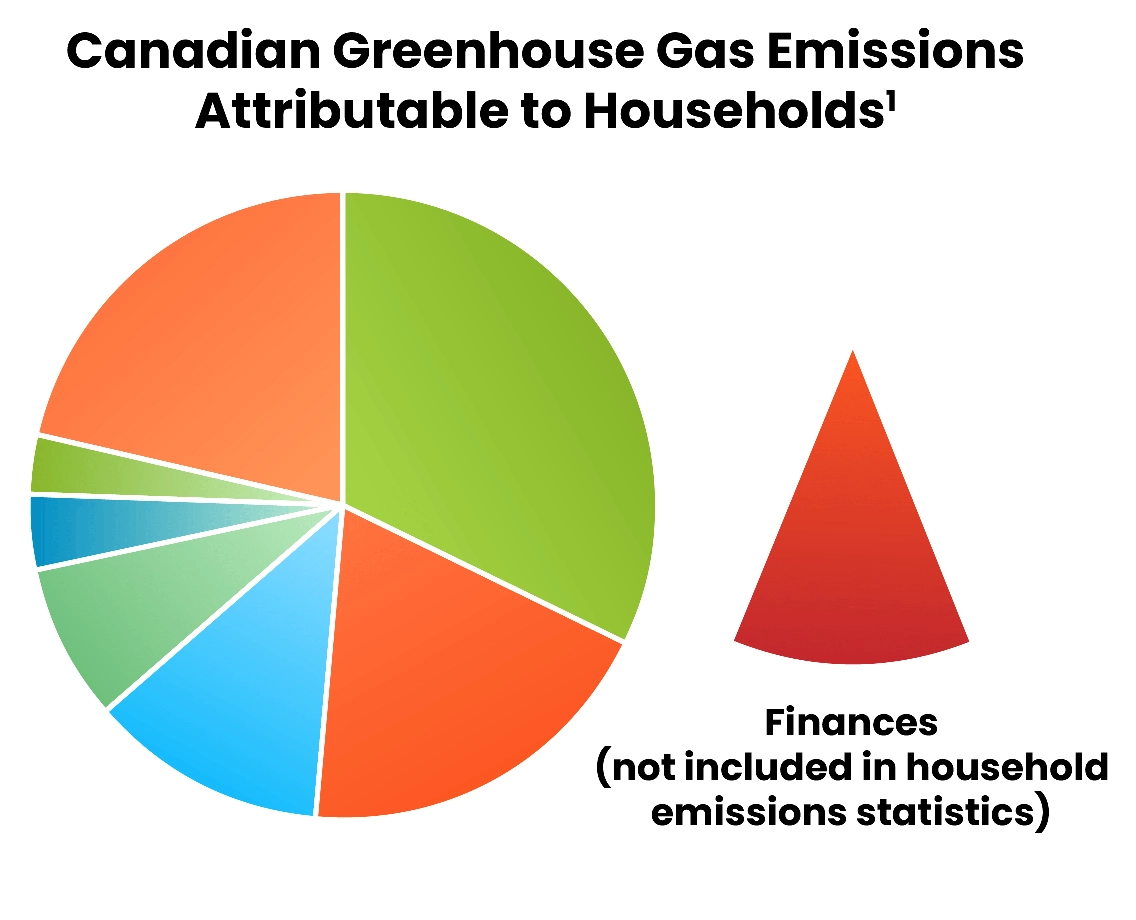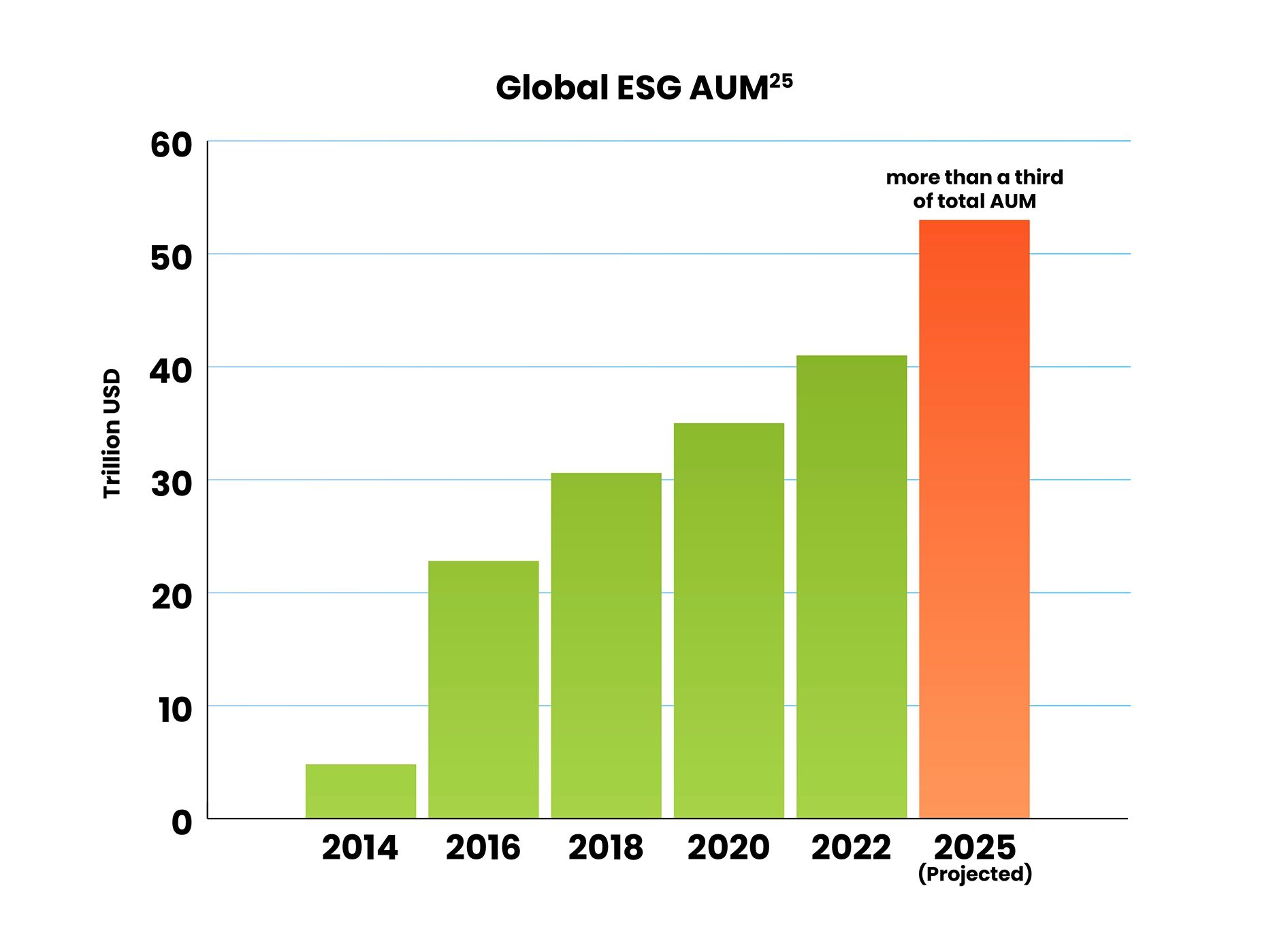Areas of Action: Your Finances and Philanthropy
A critical part of addressing the climate crisis is moving money away from the causes of the crisis and towards solutions to the crisis. As with many of the required areas of action, there is movement in the right direction but not nearly fast enough or deep enough to avoid catastrophic impacts of climate change yet. If you want to evaluate how your money may be contributing to the crisis and what you can do about it, read on.
What needs to change?
• Funding the climate crisis primarily via financing the expansion and growth of the fossil fuel sector.
• Funding the climate crisis through consumption and inaction.
• Profitably funding climate change mitigation and a sustainable future by halting funding of the crisis and funding the transition.
• Shifting our money away from what will be stranded fossil fuel assets before they are devalued by the general shift away from fossil fuels.
• Funding a sustainable future through low carbon consumption and experiences.
• Supporting environmental NGOs, governments and private sector initiatives that are addressing the climate crisis and helping those impacted by the crisis.
Why is this so important?
One of the major points of international discussion about climate change is financing — both financing of the fossil fuel industry and financing the transition to clean energy, a sustainable future, climate change adaptation and recovery from loss and damage due to climate disasters.
There is increasing public pressure on governments, pension funds, financial institutions, other institutions such as Universities and hospitals, and companies to stop financing or funding the climate crisis and to direct the needed funds towards mitigation, adaptation and loss and damage.
Individuals, often inadvertently, are part of the financing problem and this impact is not likely accounted for in personal footprint calculations even though it can be one of the largest components of your footprint2.
Why so urgent?
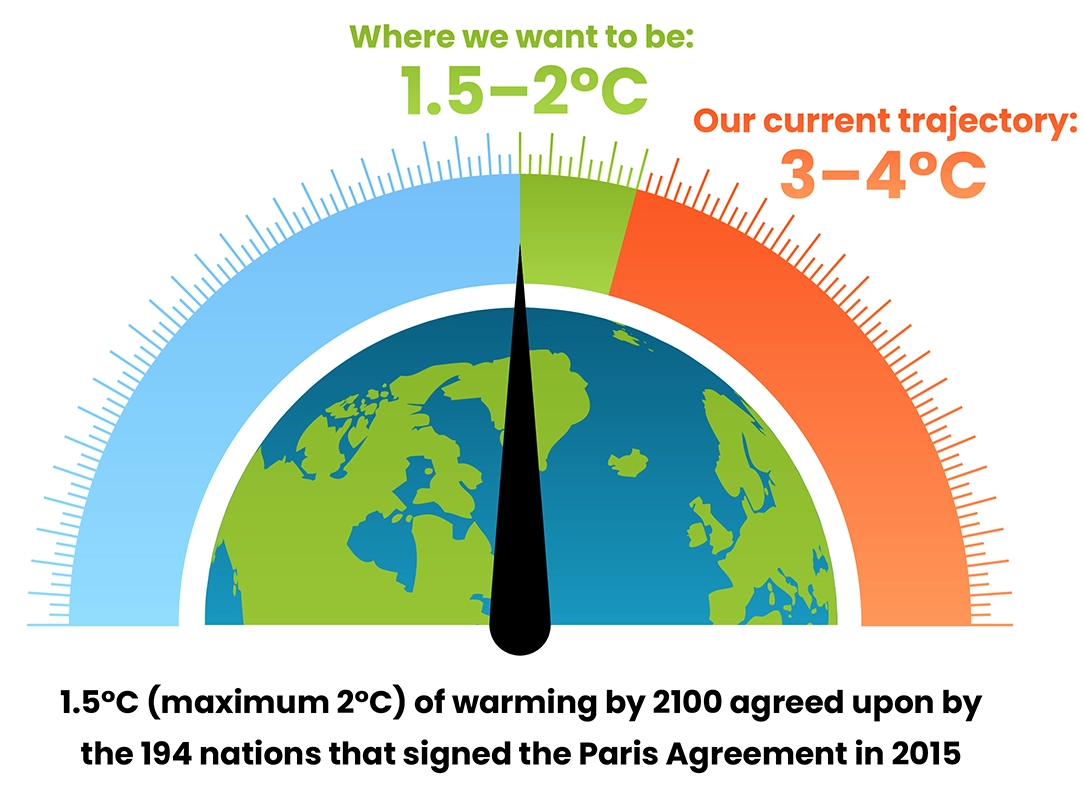
There is a rapidly narrowing window of time to implement existing commitments and raise ambition3. See Why So Urgent?
As per the Paris Agreement and subsequent IPCC modelling and research updates, we need to reduce our emissions by 43% below 2019 levels by 2030 in order to have a good chance of hitting Net Zero emissions by 2050 and avoiding the worst impacts of climate change.
Public and private funding/financing towards climate action and low carbon solutions is increasing in Canada and across the globe — in part because of public pressure. Public and private funding/financing towards the fossil fuel sector, including fossil fuel expansion is also robust, even though the IEA and IPCC have stated unambiguously that no new fossil fuel projects can occur if we are to have any hope of reaching the 1.5°C target.
Unfortunately, like many areas of systemic climate action, the financing required for the energy transition is nowhere near what is needed to accomplish our goal yet4. Nor is there sufficient funding for loss and damage due to the climate crisis. We collectively need to step up.
As citizens, we have an opportunity to think about whether you want your money (investments, disposable income, tax dollars, philanthropic contributions etc) to fund the crisis or its solutions.
Your money—opportunities for personal and systemic action
Greening your money for value AND values
Two key topics of discussion with respect to ‘greening’ your savings/investments are…
1
divesting yourself of fossil fuel investments (or specific fossil fuel types/companies/activities) and
2
impact or ESG investing5
Both can be used to shift financing away from the climate crisis but the first focuses on shifting money away from fossil fuels (to other industries irrespective of their involvement in climate change mitigation) and the latter focuses on shifting money towards companies that are socially responsible and/or consider environmental, social and governance (ESG) factors in their business ethos/strategy/models and/or operations.
Value vs. values
Although you may consider going fossil fuel free with investments because of your values, research shows that divesting of fossil fuels is also a good economic decision.

Contrary to the impression that you may have, the evidence indicates that there is either an economic benefit6, or at least no adverse impact7 from divesting of fossil fuels in your portfolio. There is also evidence that investment in renewables yields higher returns than fossil fuel investment8.
As for impact investing, there is evidence that ESG investments perform at least similarly to, and often better than, conventional investments as well9. Green finance is no longer a niche component of the economy.
Between 2012 and 2021 global green financing grew more than 100X to about $540 billion, in part because of concern about the climate crisis10. The amount of new money in ESG funds reached over $70 billion USD in 2021 alone which was a whopping 30% increase YOY11.
A 2023 report on a survey of global investors found that 74% plan to increase their ESG investments over the next year and anticipated allocating 20–50% of their portfolio to ESG funds in the next 5 years12. And there are a lot of investment options to choose from depending on your preferences. As climate reporting standardization and mandatory reporting are implemented more broadly, it will become increasingly easier to evaluate companies and funds and compare performance.
Whether you are considering fossil fuel divestment or climate-friendly investing, you are not alone. Despite the magnitude of continued investment in the fossil fuel sector (particularly by banks — see below), and the gap between actual and needed transition financing, a shift is happening, as exemplified in the charts below.
In the graph below — the numbers reflect entities. So each one needs to be pluralized. E.g. 220 Educational Institutions.
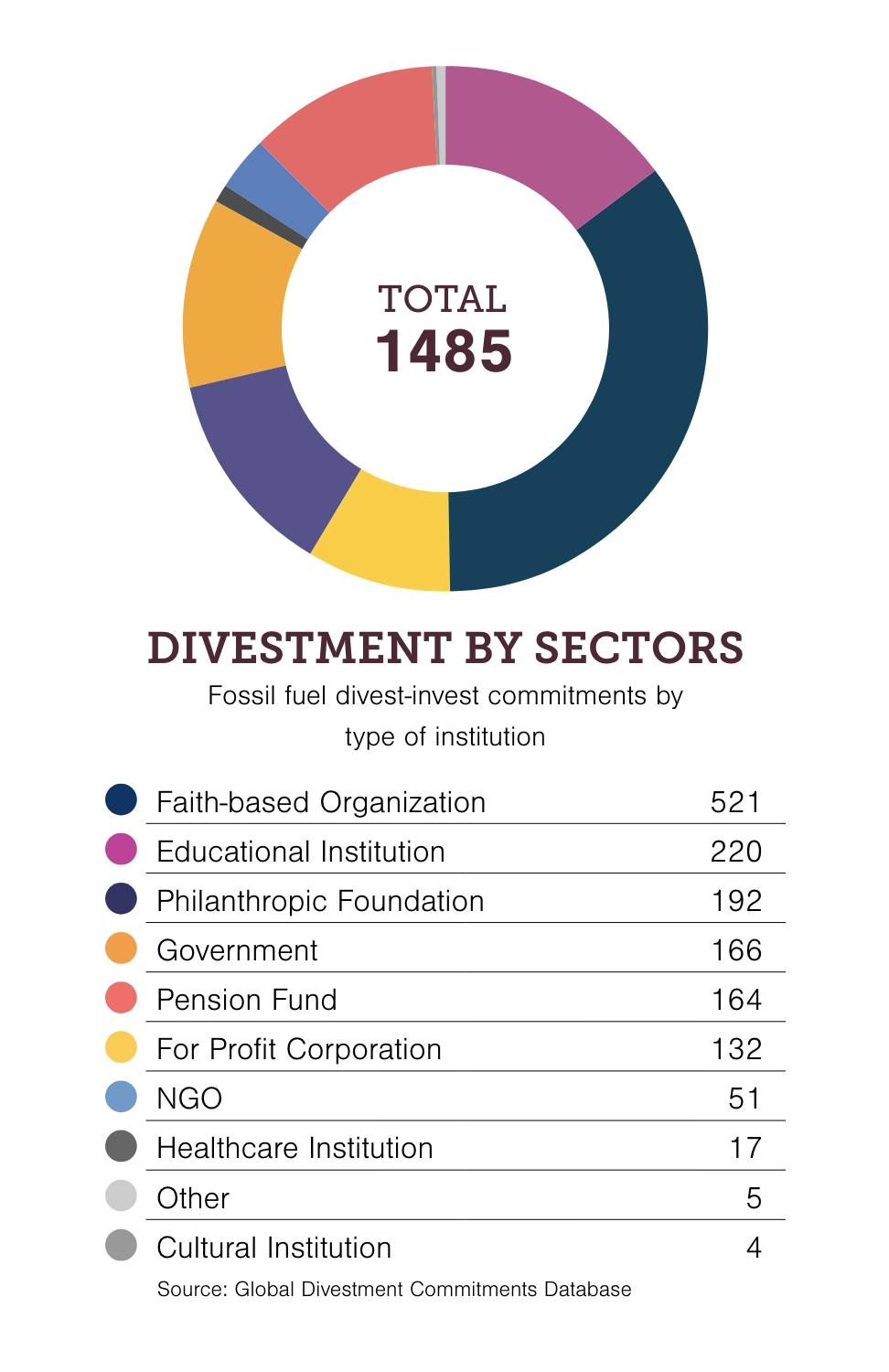
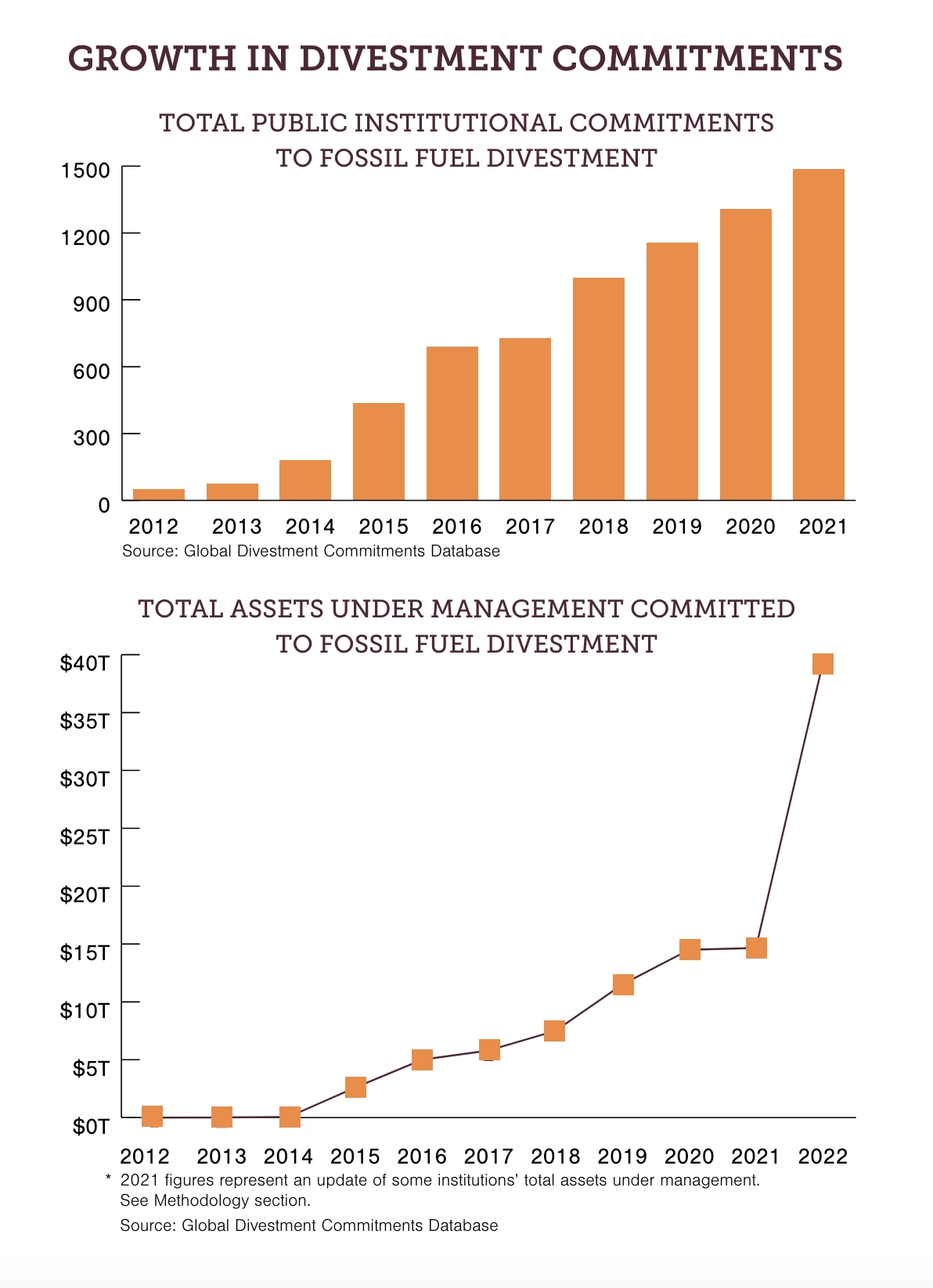
Divesting of fossil fuels — in banking, investments, and pensions
You may be inadvertently funding global warming via your bank deposits (that are invested by your bank,) your investments, and your pension.
To divest of fossil fuels in your investments

Decide what your goals are with respect to climate change investment/divestment.
For example, do you want to veer away from fossil fuel companies, fossil fuel expansion projects, specific or all fossil fuels, major financiers of fossil fuel expansion, other major greenhouse gas emitters, other companies in the oil and gas sector — e.g. pipeline and gas distribution companies etc.?
Alternatively, do you want to invest in companies that consider climate change in their strategic planning and reporting or companies that are part of the energy transition (e.g. renewables, climate tech etc.)


Review your investment portfolio to determine what its current allocation to undesired companies is.
For bonds and individual stocks, this is a somewhat straightforward process (though note that some green bonds may fund fossil fuel companies if they embark on a renewables project which may or may not align to your goals. Check the details if this matters to you.)
For mutual funds/ETFs/index funds, your financial advisor/institution should be able to provide a breakdown of companies in your portfolio for you. If they cannot, or if you don’t have an advisor, you may need to do some research online.

Make and implement a plan to…

• Just remove specific companies from your existing portfolio if you have that option via your institution/advisor (note that this gives you the most control over exclusions based on detailed criteria without otherwise altering your portfolio.)

• Shift to fossil free funds (ex-FF) — your advisor/institution should be able to provide some options. These resources may also help:

• Shift to ESG funds/green index/ETF or mutual funds/specific stocks and bonds that meet your screening criteria (note: there are even green real estate and infrastructure projects that more directly fund the transition to clean energy.)
Most financial institutions and asset managers will offer both ex-FF and Green or ESG products that they can review with you. If you are doing your own research on companies and funds, when looking at green investments, check the fund’s prospectus and look at which companies are included to determine whether it meets your needs.
If investing in stocks look at their annual filings to see if the company fits your definition of green (for example, look for good ESG ratings and reporting, green certifications and standards, or other evidence of progress towards emissions reductions.)
Look at the historical performance of funds/stocks and their volatility in relation to your investment time horizon and growth objectives as you would for conventional investments. In addition, look at the ESG reporting/transparency of fund assets/ stocks to protect against greenwashing.
(see more about corporate sustainability and red flags in Other Consumption.)

If your financial institution/advisor is not able to help you, you might consider looking for an asset management firm with experience and expertise in fossil free fund or ESG investment such as the following (used as examples only, not specific endorsements):
You can also use a green robo investing platforms if you prefer to invest directly, such as Betterment, Wealthfront, and Earthfolio.
If you are curious about the reporting standards that are coming in this space, please check out the following:
Your bank deposits
You may have your savings with a bank that heavily funds the fossil fuel industry. Although you don’t have control over how banks invest money deposited in chequing/savings accounts, you can voice your opinions about their fossil fuel investment practices and ask them whether they impose any conditions and climate reporting requirements tied to their fossil fuel investments.
HSBC, for example, funds fossil fuel companies but has cut funding for new oil and gas fields whereas RBC is investing in oil sands.
The world’s 60 biggest banks have contributed $5.5 trillion USD into fossil fuel financing since 2016, one year after the Paris Agreement was signed, with 12% of this occurring in 2022 alone15. Five large Canadian banks made the top 20 list with RBC being the 5th largest funder of fossil fuels in the world and largest funder in Canada according to a report by the Rainforest Action Network.
The following resources can help you determine how much your bank continues to invest in the fossil fuel industry in comparison with other banks:
If you are not satisfied with your bank, let them know or consider switching to another bank that does more to address the climate crisis. Banks respond to public pressure as well.
Banks are a critical source of financing of fossil fuel expansion which needs to stop if want to keep the warming of the globe to 1.5–2°C. That said, banks are also a key source and critical potential source of financing for the energy transition and climate solutions. Many are part of the United Nations Net Zero Banking Alliance.
The Canadian Bankers Association has declared a commitment by their members to Net Zero16 (though Net Zero commitments often have yet to be backed up with credible and accountable plans with transparent progress.)
Banks also offer some support to companies and individuals wanting to take climate action (see below.)
Your pension
A third way your money might be funding or fighting the climate crisis is through your pensions.
According to data tracked by divestinvest.org, 195 pension funds are among the ~1500 institutions that have made fossil fuel divestment commitments worldwide. (you can explore via their interactive database here.)
Included are the world’s largest pension fund, Norway’s Sovereign Wealth Fund18, Europe’s largest pension fund, ABP19, pension funds of some States in the US (e.g. Maine20), many major cities21 across the globe (including New York City22) and many educational institutions.
In Canada, there are a few public pension funds as well that have made divestment commitments, including Canada’s second largest pension fund, Caisse de dépôt et placement du Québec, University pension plan of Ontario, and Fonds de solidarite FTQ, according to divestinvest.org.
Most pension funds in Canada, however, have not, including Canada Pension Plan (CPP) with the public stance of the CPP investment board (CPPIB) being that they will not divest of their global fossil fuel assets. In fact, CPPIB is increasing their investments in some US energy companies that are expanding fossil extraction23.
You may not be able to control how your pension is managed, but your pension fund is supposed to serve your interests and your best fiduciary interests. As Mark Carney, former Bank of Canada Governor and Bank of England Governor warns, as continued investments in fossil fuels pose material financial risks to portfolios, funds have the fiduciary duties to consider the benefits of decarbonizing as part of their investment strategies24.
You can use your voice to put pressure on your pension fund to divest. The following resource can help you get started:
You can also help the divesting movement through the activities of the following organizations:
You may also want to read about and support proposed legislation by independent Senator Rosa Galvez, that aims to force the financial sector to consider climate risks in their investment decisions.
Financial incentives and funding support for your transition
Governmental Support
Unfortunately, the greener homes grant has expired as of March 2024. Ask your MP about new funding for individuals to help homeowners transition to clean efficient home energy.

You can find additional governmental support from federal, provincial and municipal governments using the search tool in the link below as well:
If you see a city or province that has a great incentive, write to your respective political representatives and ask them to consider something similar for their constituents.
Bank/Credit Union Support

Green loans for your home: Some banks and credit unions offer green loans to finance energy efficiency home improvements such as installing solar panels, water-saving systems, LED lighting or energy star appliances.

Green loans for personal transportation: Some financial institutions also offer EV loans to subsidize the upfront cost of purchase or they will offer a discount on car insurance for an EV.
For example: TD — Green Banking
Search for funding/loan opportunities at your financial institution.
Green mortgage options (new build homes, newly purchased existing homes and/or home retrofits)
Many banks now offer green mortgage options you can explore including green mortgage loans that can fund energy-efficiency improvements and lower your ongoing utility costs.
Budgeting for the upfront cost of bigger items in your personal action plan
There are a few key sources of emissions — primarily home heating, home energy efficiency and personal transportation if you need a car — that may take some planning and budgeting. For the most part, the budgeting aspects are relevant whether you replace your gas furnace or car with another gas furnace or car or an electric alternative.
But if you are unfamiliar with the options and what you want to buy, you are more likely to go with something familiar. And often these purchases, though larger, tend to happen when something breaks down and needs to be replaced relatively quickly.
Doing the research in advance into your replacement options and any financial incentives and financing options, as well as putting some money away for it will help to ensure that you can follow through on your climate action plan and decarbonize your life.
Greener Consumerism

Save money with reduced consumption — Calculate or estimate how much you spend in certain key categories (prioritizing high carbon/high waste categories.)
Look at opportunities to reduce consumption or replace consumption of high carbon stuff and experiences with low carbon stuff and experiences. Estimate cost savings.

Fund the climate transition with your consumption choices — from high carbon to low carbon (see other sections in Areas of Action.)

Consider a green credit card — e.g. Sustain: Green Mastercard — your points can translate into carbon offsets that protect rainforests (check to make sure they are good offsets.)
Provided that these offsets are based on purchases you would be making anyway and are not an attempt to balance out the carbon of your purchases per se, they can be a way to help fund climate mitigation.

Purchasing carbon offsets and renewable energy certificates (RECs) — For example, Gold Standard.
Green Philanthropy

Donating to climate action causes — There are many amazing environmental non-profits and charities you can support based on your areas of interest, and geographic focus and other preferences. The organizations listed in the Your Voice and Your Time page are good ones to consider. But there are countless local to global organizations all working to help address the climate crisis.
Here are a few resources to help your search if this is an area of interest for you.
Summary of potential actions
• Green your investments
• Green your savings
• Green your pension
• Support systemic change shifting finance from the crisis to its solutions
• Consider green financing, especially for larger ticket items
• Consider greener consumerism
• Support systemic change in financing your transition
• Support eNGOs
• Support NGOs that are helping those impacted by the climate crisis
• Offset your emissions
Ready to get started? Build a plan that works for you here.
References
1. Lang, T., Li, G., & Mattie, S. (2022, March 28). Data for Canadian Greenhouse Gas (GHG) emissions attributable to household consumption and use of select goods and services along with the associated emissions intensity figures and breakdowns by final demand categories. Government of Canada, Statistics Canada.https://www150.statcan.gc.ca/n1/pub/11-627-m/11-627-m2022003-eng.htm
2. The Economist. (2022, April 10). Data point: Is your pension funding the climate crisis?. Economist Impact. https://impact.economist.com/sustainability/net-zero-and-energy/data-point-is-your-pension-funding-the-climate-crisis; Green my pension. Make My Money Matter. (2023, February 22). http://makemymoneymatter.co.uk/21x/
3. United Nations Climate Change. (2023, September 22). Report: Challenges and Opportunities Identified During First Global Dialogue on Mitigation Ambition and Implementation. UNFCCC.int. https://UNFCCC.int/news/report-challenges-and-opportunities-identified-during-first-global-dialogue-on-mitigation-ambition
4. Simpson, A., & Ozyetis, B. (2023, October 19). How investing in nuclear power can contribute to this goal. Mackenzie Betterworld: the Pathway to Net Zero. https://www.mackenzieinvestments.com/en/institute/insights/the-pathway-to-net-zero-and-investing-in-nuclear-power; Krishnan, M., Samandari, H., Woetzel, J., Smit, S., Pacthod, D., Pinner, D., Nauclér, T., Tai, H., Farr, A., Wu, W., & Imperato, D. (2022, January). The Net-zero transition: What it would cost, what it could bring. https://www.mckinsey.com/~/media/mckinsey/business%20functions/sustainability/our%20insights/the%20net%20zero%20transition%20what%20it%20would%20cost%20what%20it%20could%20bring/the-net-zero-transition-what-it-would-cost-and-what-it-could-bring-final.pdf
5. Lipman, J. (2021, October 26). Divest Invest 2021: A Decade of Progress Towards a Just Climate Future. https://www.divestinvest.org/wp-content/uploads/2021/10/Divest-Invest-Program-FINAL10-26_B.pdf
6. Collinson, P. (2015, April 10). Fossil fuel-free funds outperformed conventional ones, analysis shows. https://www.theguardian.com/environment/2015/apr/10/fossil-fuel-free-funds-out-performed-conventional-ones-analysis-shows; MSCI. (2023). MSCI ACWI Ex Fossil Fuels index. https://www.msci.com/documents/10199/d6f6d375-cadc-472f-9066-131321681404; Willis, J., & Spence, P. (2015). The Risks and Returns of Fossil Fuel-Free Investing. https://senate.ucsd.edu/media/206122/the-risks-and-returns-of-fossil-fuel-free-investing-jei.pdf; Sanzillo, T., Cohn, D., & Chung, C. (2022, October 13). IEEFA U.S.: Two economies collide: Competition, conflict, cooperation and the financial case for fossil fuel divestment. https://ieefa.org/articles/ieefa-us-two-economies-collide-competition-conflict-cooperation-and-financial-case-fossil
7. Jackson, F. (2021, March 26). Global Renewables Investment Return 7 times higher than fossil fuels. https://www.forbes.com/sites/feliciajackson/2021/03/19/global-renewables-investment-return-7-times-higher-than-fossil-fuels/?sh=499033bf23c0; Imperial College Business School. (n.d.). Clean energy investing: Global comparison of investment returns. https://www.imperial.ac.uk/business-school/faculty-research/research-centres/centre-climate-finance-investment/research/clean-energy-investing-global-comparison-investment-returns/
8. Mathis, W. (2021, March 18). Renewable Returns Tripled Versus Fossil Fuels in Last Decade. https://www.bloomberg.com/news/articles/2021-03-18/renewable-returns-tripled-versus-fossil-fuels-in-last-decade
9. Norton, L. (2023, January 12). ESG investing keeps pace with conventional investing in 2022. Morningstar, Inc. https://www.morningstar.com/sustainable-investing/ESG-investing-keeps-pace-with-conventional-investing-2022; Morgan Stanley Institute for Sustainable Investing. (2019). Analyzing risk and returns of sustainable funds. https://www.morganstanley.com/pub/content/dam/msdotcom/ideas/sustainable-investing-offers-financial-performance-lowered-risk/Sustainable_Reality_Analyzing_Risk_and_Returns_of_Sustainable_Funds.pdf; Sustainable funds beating peers in 2023. Morgan Stanley. (2023, August 17). https://www.morganstanley.com/ideas/sustainable-funds-performance-2023; Merker, C. K. (2021, September 17). The stampede into ESG. CFA Institute Enterprising Investor. https://blogs.cfainstitute.org/investor/2017/05/29/the-stampede-into-ESG/; Andy, C. (2022, December 22). ESG-focused institutional investment seen soaring 84% to US$33.9 trillion in 2026, making up 21.5% of assets under management: PWC Report. PwC. https://www.pwc.com/id/en/media-centre/press-release/2022/english/ESG-focused-institutional-investment-seen-soaring-84-to-usd-33-9-trillion-in-2026-making-up-21-5-percent-of-assets-under-management-pwc-report.html
10. Chen, J. (2022, November 1). What is green investing?. Investopedia. https://www.investopedia.com/terms/g/green-investing.asp
11. Green Finance Explained. Persefoni. (2023, April 27). https://www.persefoni.com/learn/green-finance
12. Jackson, A. (2023, September 24). Eco-friendly guide to finances and saving. MoneyGeek.com. https://www.moneygeek.com/financial-planning/environmentally-friendly-finance-and-saving/
13. Department of Finance Canada. (2022, December 7). Sustainable Finance. Government of Canada. https://www.canada.ca/en/department-finance/programs/financial-sector-policy/sustainable-finance.html; Department of Finance Canada. (2022, September). Taxonomy Roadmap Report: Mobilizing Finance for Sustainable Growth by Defining Green and Transition Investments. https://www.canada.ca/content/dam/fin/publications/sfac-camfd/2022/09/2022-09-eng.pdf; Boulle, B., & Wetmańska, Z. (2022, July). Global Financial Taxonomies: Considerations for the Canadian Context. https://www.csagroup.org/wp-content/uploads/CSA-Group-Research-Global-Financial-Taxonomies-Considerations-for-the-Canadian-Context.pdf; Azoulay, O., Merle, C., Gondjian, G., & Gong, Y. (2021, November). The New Geography of Taxonomies: A Global Standard-setting Race. https://gsh.cib.natixis.com/api-website-feature/files/download/12087/the_new_geography_of_taxonomies_final_version_november__2021_natixis_gsh.pdf
14. Kelemen, I., Schroder, T., & Jongeward, C. (2023, July 5). Canadian Securities Administrators statement on proposed climate-related disclosure requirements. https://www.securities-administrators.ca/news/canadian-securities-administrators-statement-on-proposed-climate-related-disclosure-requirements/; Kelemen, I., Schroder, T., & Jongeward, C. (2022, October 12). Canadian securities regulators consider impact of international developments on proposed climate-related disclosure rule. https://www.securities-administrators.ca/news/canadian-securities-regulators-consider-impact-of-international-developments-on-proposed-climate-related-disclosure-rule/
15. Banking on Climate Crisis — Fossil Fuel Finance Report 2023. Rainforest Action Network. (2023). https://www.ran.org/wp-content/uploads/2023/04/BOCC_2023_vF.pdf
16. Banks in Canada committed to a net‑zero economy by 2050. Canadian Bankers Association. (2024, March 6). https://cba.ca/banks-in-canada-committed-to-a-net-zero-economy-by-2050
17. Divestment Database: The database of fossil fuel divestment commitments made by institutions worldwide. Stand.earth. (2023, December 15). https://stand.earth/our-work/campaigns/divestment-database/
18. Katz, M. (2019, June 21). Norway approves sovereign wealth fund fossil fuel divestment. Chief Investment Officer. https://www.ai-cio.com/news/norway-approves-sovereign-wealth-fund-fossil-fuel-divestment/
19. Sterling, T., & Jessop, S. (2021, October 26). Dutch pension giant spurns fossil fuels as funds shift before COP26. Reuters. https://www.reuters.com/business/sustainable-business/dutch-pension-fund-abp-sell-175-bln-fossil-fuel-assets-2021-10-26/
20. Bradford, H. (2023, May 22). Divesting fossil fuels looms larger for more funds. Pensions & Investments. https://www.pionline.com/ESG/divestment-fossil-fuels-looms-larger-some-asset-owners
21. Divesting from Fossil Fuels, Investing in a Sustainable Future Accelerator. C40 Cities. (2023, October 12). https://www.c40.org/accelerators/divest-invest/
22. Comptroller Stringer and Trustees Announce Successful $3 Billion Divestment from Fossil Fuels. New York City Comptroller. (2021, December 22). https://comptroller.nyc.gov/newsroom/comptroller-stringer-and-trustees-announce-successful-3-billion-divestment-from-fossil-fuels/
23. Sarfraz, A. M. (2023, June 26). Investors for Canada’s pension plan double down on oil. Canada’s National Observer. https://www.nationalobserver.com/2023/06/26/news/investors-canada-pension-plan-double-down-oil
24. West Berkshire Council pensions divestment from Fossil Fuels Motion. Local Government Association. (2019, December). https://www.local.gov.uk/lga-libdem-group/resources/template-motions/west-berkshire-council-pensions-divestment-fossil-fuels
25. Bloomberg. (2021, February 23). ESG assets may hit $53 trillion by 2025, a third of global AUM. Bloomberg.com. https://www.bloomberg.com/professional/insights/markets/ESG-assets-may-hit-53-trillion-by-2025-a-third-of-global-aum/; Bloomberg. (2022, January 24). ESG May Surpass $41 Trillion Assets in 2022, But Not Without Challenges, Finds Bloomberg Intelligence. Bloomberg.com. https://www.bloomberg.com/company/press/ESG-may-surpass-41-trillion-assets-in-2022-but-not-without-challenges-finds-bloomberg-intelligence/#:~:text=According%20to%20BI%2C%20ESG%20assets,Bloomberg%20Intelligence%27s%20base%2Dcase%20scenario.; Kramer, M. (2019, December 29). 2014: The year sustainable investment went mainstream. GreenBiz. https://www.greenbiz.com/article/2014-year-sustainable-investment-went-mainstream


